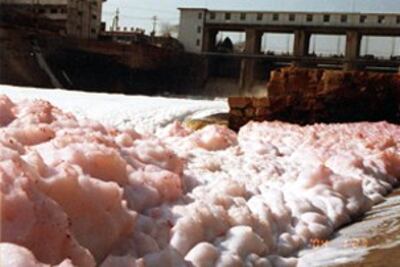HONG KONG—A pioneering environmental photographer who documented the pollution of China's Huai River has been awarded what is considered the Asian equivalent of the Nobel prize. Two Chinese government officials also received the award.
Former news photographer Huo Daishan, 56, received one of the 2010 Ramon Magsaysay Awards—presented by the Philippines-based Ramon Magsaysay Foundation—for bringing to public and official attention the massive pollution of China's third-largest river.
Huo said he grew up on the banks of the Huai River and had a deep emotional link with the area.
"I cooked up my project in order to give the higher levels of leadership a basis on which to manage things," said Huo.
The Huai River basin—an intricate network of rivers, lakes, and fishing villages—has been the subject of poetry and music for generations, stimulating the popular imagination with scenes of rural peace and plenty by its rippling shores.
But since China's economic miracle came to the region in the late 1990s, the Huai River has been reduced to a toxic mess by industrial effluent from businesses along its banks, and some of its formerly idyllic villages now have cancer rates at least 10 times higher than they were three decades ago, according to local residents and environmental activists.
"There were basic problems like these at the grass roots," Huo said. "They were dealing with them with no synthesis between development and the environment."
Based in the central province of Henan, Huo began documenting shocking scenes of industrial pollution, dead fish, and poisonous fumes near his hometown, beginning with clothesline-mounted exhibitions in his village street and gradually expanding to a library of 15,000 images which has toured all over the country.
Huo's work exposed the illegal activities of local officials and factory owners, but he was undeterred, linking up with local authorities and industry to install deep water wells and low-cost water filters.
His efforts resulted in some improvement, although "the problem of pollution remains critical," the Magsaysay Award Foundation said in a statement.
Effecting change

Huo said he had been threatened during the course of his work from a number of quarters.
"It has come from the local government," Huo said. "It has also come from a few enterprises that were wantonly discharging polluted waste. I have had secret phone calls, my camera has been smashed, I have even been beaten up."
Huo said his aim has always been to use grassroots activism as a means of promoting government environmental policy, a goal which he sees as having met with some success.
Since he quit his job in 1998 to set up the "Huai River Defenders," government officials have put more resources into managing pollution and waste-water discharge into the waterway, setting limits for the whole river basin, Huo said.
"There has been some help in cleaning up our drinking water ... and the health ministry has set targets for waste water in the Huai River and human health," he said.
"There has been improvement in all areas which we are addressing in our work."
"The biggest problem has been one of funding," Huo said. "Another thing is that there needs to be more space for the nongovernment (NGO) sector to develop and open up. Thirdly, the rights and interests of ordinary people must be maximized. I think that is realistic and that there's room to do that."
Officials lauded
China's deputy environment minister Pan Yue and Zhejiang village chief Fu Qiping also received awards for their "bold, constructive work in seizing and creating opportunities to address China's environmental crisis."
Song Xinzhou, head of the nongovernment environmental group Green Beijing, said the award was a boost for Pan, who had ruffled a great many feathers in local governments and enterprises across China since taking office.
"Pan Yue has been behind a large number of environmental impact assessments, and he has ordered a large number of businesses to stop operations," Song said.
"There are also a lot of departmental vested interests in several of these enterprises. So he is carrying a huge amount of pressure [in his position]."
The awards, named after a popular Philippine president who died in a plane crash in 1957, will be presented at a formal ceremony on Aug. 31.
Former mayor of Hiroshima Tadatoshi Akiba was also honored for his work in telling the world about the horrors of the atomic bomb that was dropped on his city by American forces when he was three years old.
Akiba painfully recognized that his city had the moral obligation to warn the world of the nuclear danger, the Magsaysay Award organizers said. He leads a movement called "Mayors for Peace" that includes more than 4,000 cities in 144 countries.
Original reporting by Tang Qiwei. Translated and written in English by Luisetta Mudie.
